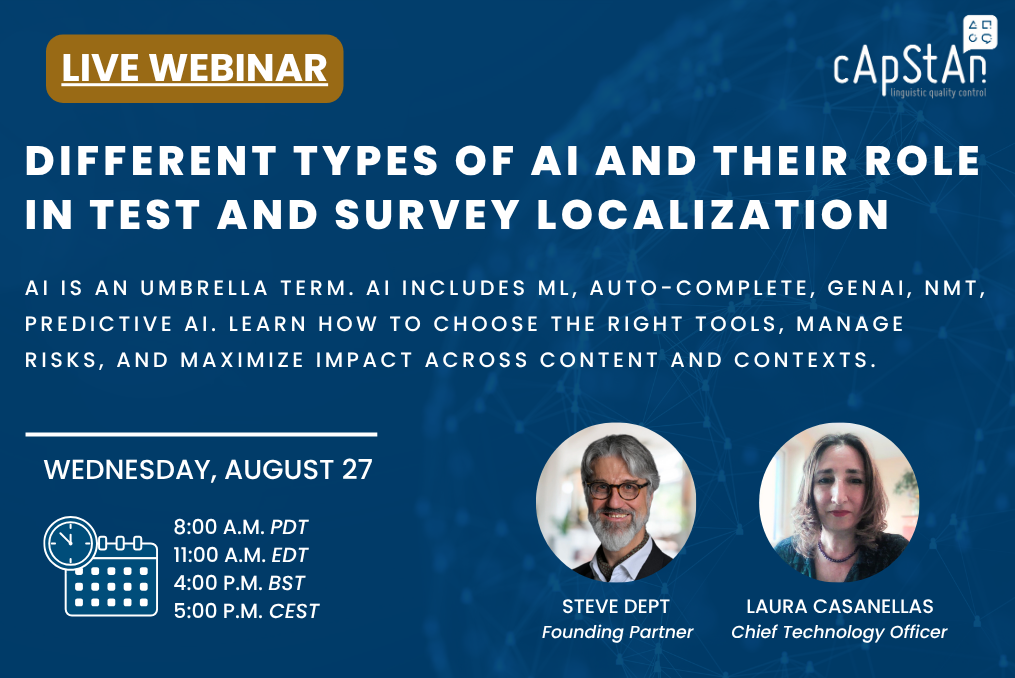
Leveraging Translation Technology with Discernment | The Keys to Smart Localisation unveils on August 27, 2025
Translation and localisation has traditionally been a cost centre, and the work performed by professional translators was mostly paid by word, by line, by page. Today, this model has become meaningless: translating half a million words or generating 100 pages directly in a foreign language can be done faster and cheaper than crafting two or three comparable language versions of a short questionnaire. The translation of many types of content is commoditised, available in real time at no additional cost. Yesterday, organisations paid to have their content translated and made fit for purpose. Today, the same organisations invest in workflows that give them more control over the criteria that different types of localised content must meet.
Enter the language engineers, the translation technologists, and the notion of content profiling. Exit the cost centre, enter the investment. A language solutions integrator in 2025 is a skilled consultant who needs the help of professional linguists to set benchmarks, to evaluate output, or to help identify when it is necessary to deviate from the original text to obtain the desired effect for the target audience. That is what cApStAn and other pioneers offer today. It ranges from selecting and training tools, models and engines to automating the quality estimation of machine translation output. We can identify the points in the workflow where human expertise adds the most value. Once the workflows are set up, all you need is a good service level agreement (SLA) to maintain, provide support, and occasionally troubleshoot. An investment rather than a cost centre.
One of the goals stated in our mission statement is “To develop, upgrade and promote good practices in test and survey localization”. In that spirit, we ran a survey in the spring of 2025 to ask you (our users, our partners, our clients, our peers) what content made you tick and in what form you would like to consume it. While it is challenging to address all the more specific requests that many respondents formulated, the results allowed us to single out core areas of particular interest to a majority of you. Subsequently, we are planning to share our knowledge of tools and processes through webinars, starting on August 27, 2025. Save the date!
In this session, we shall provide an overview of different types of AI and how they relate to test and survey localisation. There are AI-powered tools that are usually accessible to professionals: closed large language model application programming interface (closed LLM API, for short), licensed machine translation, automated quality estimation. Professionals are informed of the risks that come with the use of generative AI and should be transparent about how the manage these. There are also public machine translation (MT) providers and publicly available LLMs, with their own set of risks and limitations. Together, we shall examine the types of content that lend themselves well to the different tools, taking into account the intended use of the translated version, the domain, and the language pair: there is a considerable variability based on these (and other) criteria. We shall end the first session with a high-level overview of what training and fine tuning a model (or a tool) means, and what it takes to train and fine tune.
After the first webinar, we plan to host multiple sessions where we will deep dive into the topics discussed on August 27 and cover other important elements of translation technology. For example- we will go through all the motions of building what we refer to as a hybrid workflow. “Hybrid” refers to the interaction between man and machine, so, together, we shall set up a supervised automated translation workflow. We will ensure that everyone gains a high-level understanding of what language assets are, in what context they are useful, and how to leverage them.
Together, we will investigate how far a layperson can go in effectively training and fine-tuning, with a hands-on exercise.
With our different modules under your belt, you will be knowledgeable enough to usefully engage with language solution providers and make the most of your investment in localisation.
Enrol now to the first session on 27th August!
~ Steve Dept, Co-Founder